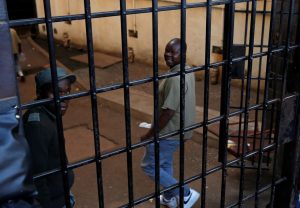Both Houses of Parliament Will Resume Sitting on Tuesday 27th August
The Senate’s Special Sitting on 14th August
Recalled from their recess by the President to conduct special business [see Bill Watch 45/2019 of 12th August [link] – Senators assembled on Wednesday 14th August for a single sitting that lasted for just over eight hours, with the adjournment until Tuesday 27th August coming at 10.37 pm. The special business specified by the President was passing the Appropriation Supplementary (2019) Bill, the Finance (No. 2) Bill and the Maintenance of Peace and Order Bill.
Fast-tracking
Senators began by approving a Government motion to fast-track all three Bills by suspending all Standing Orders that might otherwise prevent them from taking all stages of the Bills the same day. Asked by the President of the Senate to give reasons for the motion, the Minister of Justice, Legal and Parliamentary Affairs briefly referred to the fact that the Second Session of the present Parliament would be starting in September, that the Government wished Parliament to complete the Bills before the end of the current Session and that the Maintenance of Peace and Order Bill, part of the Government’s “legislative reform agenda which had been outstanding for a long time”, had already been subjected to a long delay by the Parliamentary Legal Committee [PLC]. He did not, however, mention the special need for the Finance (No. 2) Bill to be gazetted as law on or before 21st August – which we explained in Bill Watch 45/2019 [link]; as things turned out, this deadline was met [see below under Acts gazetted].
Maintenance of Peace and Order Bill
The Senate first tackled the Maintenance of Peace and Order Bill. The Minister of Justice, Legal and Parliamentary Affairs piloted the Bill through the Senate instead of the Minister of Home Affairs and Cultural Heritage, who is the responsible Minister. In his speech commencing the Second Reading stage the Minister explained to Senators the changes that had been made to the Bill by the National Assembly [link] before it reached the Senate. Discussion of the Bill took until after 9 pm, with a fifteen-minute “re-energisation break” just after 8 pm. Opposition Senators bombarded the Minister with criticisms of the Bill and suggestions for improvements. The Minister, however, made only one concession – he accepted an amendment to clause 7(5), which will now read as follows:
‘Any person who knowingly fails to give notice of a gathering in terms of subsection (1) or of the postponement or delay of a gathering in terms of subsection (3) shall be liable to a fine not exceeding level 10 or to imprisonment for a period not exceeding one year or to both”.
The MDC-A Chief Whip in the Senate, Senator Lilian Timveos, warned that the Opposition considered the Bill to be so inconsistent with the Constitution that challenges in the Constitutional Court were inevitable.
Eventually, the amended Bill was referred back to the PLC for a report on the amendment’s consistency with the Constitution.
Finance (No. 2) Bill [link] & Appropriation Supplementary (2019) Bill [link]
These two Bills were approved by the Senate as passed by the National Assembly, but not without protests and questions from Opposition Senators.
Protests centred on complaints that some Senators had not had been supplied with copies of the Bills and had, therefore, been unable to study them.
Questioned about the new PAYE tax-free threshold of $700 per month, Minister Ncube said the figure of $700 had been suggested to his Ministry during consultations with all the important National Employment Councils and accepted as fair, but, if it proved to be too low during the next few months, could be raised in the next Budget. On whether new allocations of funds for provincial and local government bodies were constitutionally compliant he said they were, and pointed out he had ensured that the sum allocated to provinces and local authorities achieved the constitutional minimum of 5% of national revenues for the financial year, as fixed by section 301(3) of the Constitution. But disbursement of funds allocated to provinces would depend on the enactment of new legislation for Provincial Councils, who would between them be getting one-quarter of that 5%. Minister Ziyambi added that the constitutional provisions for devolution contained inconsistencies that needed to be corrected; this would be dealt with in the Government’s proposed omnibus Constitution Amendment Bill, which would also attend to “a lot” of other things, such as the timing of delimitation of constituencies and other areas for electoral purposes.
Acts gazetted On 16th August Parliament sent both these Bills to the President and on 21st August both were gazetted as Acts, having received the President’s assent – Finance (No. 2) Act, 2019 (No. 7 of 2019) [link] and Appropriation Supplementary (2019) Act, 2019 (No. 8 of 2019) [link]. The former Act’s re-enactment of the Presidential Powers (Temporary Measures) (Amendment of (Amendment of Reserve Bank of Zimbabwe Act and Issue of Real Time Gross Settlement Electronic Dollars (RTGS Dollars)) Regulations, 2019, Statutory Instrument 33/2019, became law only hours before the expiry of the statutory instrument.
Coming Up in Parliament This Week
According to the Parliamentary Sitting Calendar, MPs should have been enjoying a recess from 2nd August to 10th September, the day scheduled for the opening of the Second Session. Instead, both Houses had to sit in the week commencing 5th August, and Senators were recalled for a late night sitting on 14th August, described above. And Committee members are presently conducting public hearings around the country on the Freedom of Information Bill and Marriages Bill. This week both Houses face at least three more days’ overtime.
Whether this will be the last week of sittings in the First Session – and whether the next Session will open on 10th September or be postponed – remained uncertain at the time of writing. But three days are unlikely to make an impressive improvement to this Session’s output of Bills.
In the Senate
Maintenance of Peace and Order Bill Senators await the PLC’s report on the amendment the Senate made last week to clause 7(5) of the Bill [see above]. If, as expected, it is a non-adverse report, the amended Bill will nevertheless have to go back to the National Assembly for its approval. So Parliament may not be able to finalise the Bill this week.
Report of the Thematic Committee on Human Rights on Visits to Police Stations and Border Posts Item 1 on the Order Paper for 27th August is the motion by committee chairperson Senator Sekeramayi for the Senate to take note of this report.
Motions The Order Paper also lists resumption of adjourned debates on motions on protection of the environment; the need for a legislative framework on pensions and insurance benefits; enforcement of the law on child marriages; perennial shortages of safe, clean and potable water.
Question Time New questions listed for Thursday afternoon include one seeking an explanation from the Minister of Higher and Tertiary Education, Science and Technology Development regardinguniversity students’ loans, including disbursement agency, selection criteria and repayment modalities; and another asking the Minister of Foreign Affairs and International Trade when the Government will sign the AU’s Malabo Protocol on the Pan-African Parliament.
In the National Assembly
Bills
The first four items on the Order Paper for 27th August concern Bills:
Zimbabwe Investment and Development Agency Bill – for resumption of the Committee Stage. There are several pages of proposed amendments to the Bill to be considered.
Money Laundering and Proceeds of Crime Amendment Bill – for commencement of Second Reading Stage. There is pressure coming from the international Financial Action Task Force for this Bill to be passed.
Coroner’s Office Bill – for commencement of Second Reading Stage.
Education Amendment Bill – for consideration of the adverse report by the PLC on the amendments to the Bill made during the Committee Stage. At this stage the contents of the adverse report are not known.
International Agreement for Approval: Beijing Treaty on Audio-Visual Performances
Item 5 on the Order Paper is a lengthy resolution presented by the Minister of Justice, Legal and Parliamentary Affairs seeking approval of the Beijing Treaty on Audio-Visual Performances (2012). The resolution states that the Treaty recognises the rights of performers against unauthorised use of their performances; facilitates the protection of culture, folklore and cultural diversity by contributing to the protection of traditional cultural expressions and national folklore; and also helps strengthen local audio-visual industries by its international system of protection, thereby creating employment.
Committee Reports on Petitions to Parliament
Several take-note motions are listed regarding Portfolio Committee reports: (1) The Budget, Finance and Economic Development Committee’s report on Mr Ganagana’s Petition on Progress on Implementation of Recommendations of the Smith Commission of Inquiry into the Conversion of Insurance and Pension Values from Zimbabwe Dollars to US Dollars; (2) the Defence, Home Affairs and Security Services Committee’s report on the Petition by the Gwanda Community Youth Development Trust on access to primary documents; (3) the Public Service, Labour and Social Welfare Committee’s report on a Petition regarding Delays in Operationalising of SI 125/2013, the Non-Public Service Probation Officers Regulations; and (4) the Local Government Committee’s report on Gwanda Residents’ Petition on violation of rights to human dignity, water and clean environment.
Question Time [Wednesday]
97 questions with notice are listed, some dating from as long ago as November 2018. Hon Matsikenyere asks the Minister of Youth, Sport and Recreation to state the Government’s position on the dissolution of the Zimbabwe Cricket board by the Sports and Recreation Commission and whether her Ministry has plans to engage the International Cricket Council to rescind its decision to suspend the Zimbabwe cricket team.
Veritas makes every effort to ensure reliable information, but cannot take legal responsibility for information supplied.
Post published in: Featured
 Kathryn Rubino is a Senior Editor at Above the Law, and host of The Jabot podcast. AtL tipsters are the best, so please connect with her. Feel free to email her with any tips, questions, or comments and follow her on Twitter (@Kathryn1).
Kathryn Rubino is a Senior Editor at Above the Law, and host of The Jabot podcast. AtL tipsters are the best, so please connect with her. Feel free to email her with any tips, questions, or comments and follow her on Twitter (@Kathryn1).

















